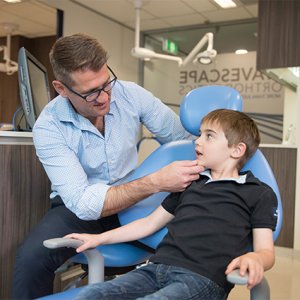 When your child starts to lose their baby teeth and have their adult teeth start to erupt, it can be challenging to understand what is normal and when to be concerned.
When your child starts to lose their baby teeth and have their adult teeth start to erupt, it can be challenging to understand what is normal and when to be concerned.
Understanding what is expected for each age can help you feel more confident and know when it might be time to consult an orthodontist. So, we’ve provided a guideline for when to expect these changes to occur.
This guide outlines the expected eruption of permanent teeth and the natural shedding (exfoliation) of baby teeth. It’s important to note that this is a guideline and understand that each child is individual, and these timings may vary. This guideline holds true for ~75% of people, but the difference between the youngest 1% and the oldest 1% can be up to 6 to 7 years.
Timeline
Children typically start exfoliation of baby teeth around age 6, with all adult teeth (excluding wisdom teeth) usually erupted by age 12-13. The order and age range can vary, but here’s a general guide:
- Ages 6-8:
Lower central and lateral incisors exfoliate first, followed by the upper incisors. The first adult molars (often referred to as “6-year molars”) also erupt at this stage - Ages 9-12:
Canines, first and second baby molars fall out to then be replaced by 1st and 2nd adult premolars and canines. - Ages 12-13:
Second adult molars erupt — commonly known as “12-year molars.”
When to Be Concerned
It’s a good idea to book a consultation with an orthodontist if:
- Your child has not lost any baby teeth by age 7-8
- A baby tooth has been extracted due to decay
- Baby teeth are still present when adult teeth are visibly erupting behind or around them
- Adult teeth are coming in crowded, twisted, or with significant spacing
- Baby teeth are lost very early (before age 4-5), which can lead to space loss or misalignment
- There are missing adult teeth (congenitally missing teeth) identified by your dentist or on X-rays
- Your child has had an adult tooth erupt, but the baby tooth on the other side of the face is still present more than 6 months later
If you have any concerns about your child’s teeth and would like to book in a consultation, contact our reception team who can organise an appointment for you.
